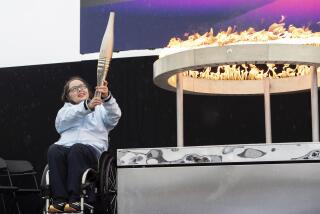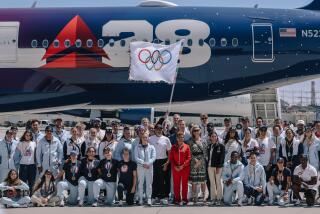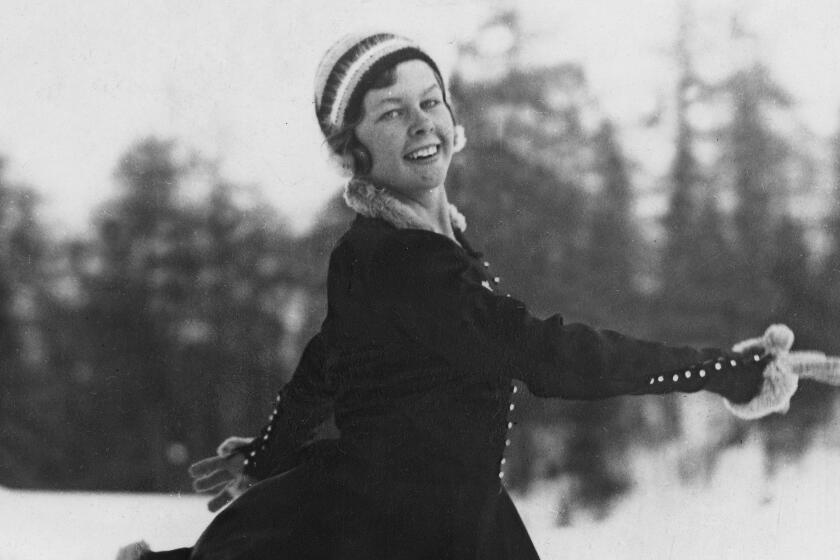La Palma Teacher to Carry Olympic Torch, Thanks to Student
Runners from Southern California, beginning with an Orange County teacher, will soon get the Olympic flame started on its journey to the Summer Games in Atlanta. And in the city that taught the world 12 years ago how to sell the Olympics, the grand relay will be brought to you by Coca-Cola.
By sponsoring the torch run, the beverage company bought the right to pick one-fourth of the 10,000 men and women who will carry the flame, and will do so from mail-in entries tucked into 12-packs of Coke.
On Tuesday, teacher Scollie Keith of La Palma became the first person in Southern California named by Coke to add life to the relay.
“I’m elated,” said Keith, 51, who was nominated by John Brown, a student in her eighth-grade English class at Vanguard Learning Center in Compton. Keith broke into tears when John, 13, told a group of reporters and Olympic athletes gathered at the Amateur Athletic Foundation office in the West Adams district that he had nominated Keith because she is “a sweet, loving lady who does bold and courageous acts.”
Being nominated by one of her students, Keith said, was especially gratifying. “I do what I do without the thought of receiving anything. I’m so excited by this.”
Keith, who walks two to three miles a day, said she will increase that routine to four miles to get ready for her one-kilometer run. “I want to look good and feel good [for the relay],” Keith said.
Keith is one of 60 Southern Californians who will be selected by Coca-Cola. After its Los Angeles start on April 27, the relay will proceed to Orange County, San Diego, Arizona, Nevada, then to Santa Barbara and through Northern California before moving on to Oregon and much of the continent.
The torch will travel through 43 states before being used July 19 to light the Olympic flame that will burn throughout the Atlanta Games.
Through its torch relay promotion, the company hopes to give average folks a chance to take part in ceremonies otherwise dominated by world-class athletes and celebrities. The entry blanks provide enough space for about one sentence to state why the person nominated deserves to carry the torch.
Selection of the torch-bearers will be largely random, said Tim McCabe, vice president of sales and marketing for the Coca-Cola Bottling Co. of Los Angeles.
“The point is that someone should be able to nominate their mom, dad, brother, teacher, coach or friend,” McCabe said.
McCabe also emphasized that those who can’t walk or run also can participate, because parts of the torch are carried through portions of the relay on airplanes, trains and boats.
The 7,500 torch carriers not chosen by Coca-Cola will be former Olympic athletes and those picked by the United Way for their community service.
Corporate sponsorship of the Olympic Games was elevated to new heights by the 1984 Los Angeles Summer Games, when corporate logos became as prominent as national flags.
That year, anyone willing to spend $3,000 could buy the right to carry the torch for a kilometer. O.J. Simpson was one of the most prominent runners, taking the flame from Pacific Coast Highway into Santa Monica.
The torch relay originated at the 1936 Games in Berlin.
Rafer Johnson, former UCLA track star and 1960 Olympic decathlon winner, also attended the Tuesday kickoff. Johnson, who at 60 looks like he could compete this year, said that lighting the Olympic flame in the Los Angeles Coliseum to start the 1984 Games was as thrilling as competing in the Games.
“I think what people feel as they carry the torch will be the same feeling I had as an athlete. There’s a connection to others from throughout the world as well as to previous Olympians,” Johnson said.
Johnson, who was a member of the organizing committee for the 1984 Los Angeles Games, said that the increased commercialization of the Olympics has been necessary for the Games’ survival.
“Commercialism is what saved the Olympics,” he said, pointing out that before the profitable Los Angeles Games, host cities traditionally lost great sums of money.
More to Read
Go beyond the scoreboard
Get the latest on L.A.'s teams in the daily Sports Report newsletter.
You may occasionally receive promotional content from the Los Angeles Times.






